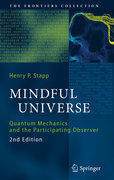
Mindful universe: quantum mechanics and the participating observer
Stapp, Henry P.
The classical mechanistic idea of nature that prevailed in science during theeighteenth and nineteenth centuries was an essentially mindless conception: the physically described aspects of nature were asserted to be completely determined by prior physically described aspects alone, with our conscious experiences entering only passively. During the twentieth century the classical concepts were found to be inadequate. In the new theory, quantum mechanics, our conscious experiences enter into the dynamics in specified ways not fixed by the physically described aspects alone. Consequences of this radical change in our understanding of the connection between mind and brain are described. This second edition contains two new chapters investigating the role of quantum phenomena in the problem of free will and in the placebo effect. Accessible treatment of mind versus matter. Discusses the ethical consequences of the mind-versus-matter debate. Describes how quantum mechanics can radically change our understanding of the connection between mind and brain. New edition discusses the possible role of Quantum Mechanics in Free Will and in the Placebo Effect INDICE: Preface to the First Edition. Preface to the Second edition. Science Consciousness and Human Values. Human Knowledge as the Foundation Science. Actions, Knowledge, and Information. Nerve Terminals and the Need to Use Quantum Theory. Templates for Action. The Physical Effectiveness of Conscious Will and the Quantum Zeno Effect. Support from Contemporary Psychology. Applicationto Neuropsychology. Roger Penrose’s Theory and Quantum Decoherence. Non-Orthodox Versions of Quantum Theory. The Basis Problem in Many-Worlds Theories. Despised Dualism. Whiteheadian Quantum Ontology. Interview. Consciousness and theAnthropic Questions. Impact of Quantum Mechanics on Human Values. Placebo: A Clinically Significant Quantum Effect. Science-Based Discussion of Free Will. A.Gazzaniga’s The Ethical Brain. B.Von Neumann: Knowledge, Information, and Entropy. C. Wigner’s Friend and Consdciousness in Quantum Theory. D. Orthodox Interpretation and the Mind-Brain Connection. E. Locality in Physics. F. Einstein Locality and Spooky Action at a Distance. G. Nonlocality in the Quantum World. References. Index.
- ISBN: 978-3-642-18075-0
- Editorial: Springer Berlin Heidelberg
- Encuadernacion: Cartoné
- Páginas: 222
- Fecha Publicación: 01/03/2011
- Nº Volúmenes: 1
- Idioma: Inglés
